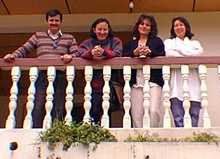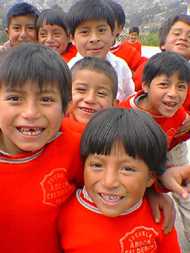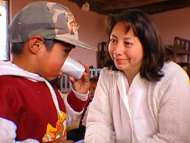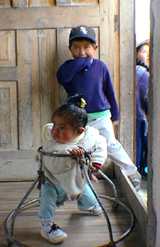|
In the town of Turi and its 18 surrounding communities, health care is unfortunately not a first priority among many single mothers. Because many fathers have abandoned their families in search of work in Ecuadorian cities or the United States, women's days are consumed with more urgent agendas of survival. Aside from raising children in unhealthy households, the women are also often unable to make the journey to one of the only two health centers in the region when a child is ill. Esquel and the Cirugia Interandina de Especialidad (CINTERANDES) have literally brought health care to the people with Salud Integral Turi- a new variation on the traditional house call.

 |

Volunteer doctors
|

CINTERANDES is an organization of volunteer doctors that provides people of the surrounding countryside with various health services. Not only do the physicians devote time towards preventative and reactive health care, but with the new program Salud Integral Turi, they have also devised methods of actually bringing services to families that cannot access regular facilities. With financial backing from Esquel, doctors and nurses periodically visit the Turi area to make home diagnoses, sometimes walking the long route that serves approximately 5000 people. The two groups have also begun work on a permanent health center that will provide ongoing health services for little or no charge. CINTERANDES also operates a surgical truck that travels to local barrios for more serious surgical treatment. In the five months that the truck has operated, its volunteer doctors have operated on 42 people. The most common patients are youths suffering from umbilical complications, hernias, and non-descended testicles.

Ethan and I accompanied Esquel staff member Natacha Reyes and Doctor Fernando Vidal on the program's visit to a local Turi school
 |

Children at the
local Turi school.
|
and two nurseries to administer the parasite vaccine, Albenzol. In a completely reassuring and friendly manner, the doctor assembled the children and handed out oral medicine with a chaser of soda. As Natacha and Doctor Vidal explained to us, the children need anti-parasitic medicine because they live in unsanitary conditions—not properly washing and drinking contaminated water. After the doctor delicately coaxed all the children into taking the medicine, Natacha frankly reminded them, "And remember, wash your hands after you go the bathroom." Instead of breaking out into peals of laughter, the children responded with fervent head-nods, listening to the helpful words of their health providers.

 |

A child takes his medication
|
 After tending to children in need of Albenzol, we stopped by the site of the new health center. Located in the community of Santa Boibare, the center will provide many working mothers with adequate health plans for the first time in their lives. Esquel's contribution to this new facility has been integral to its establishment. Not only have they helped fund the center's construction, but they will also assist Salud Integral Turi in hiring personnel and purchasing instruments.
After tending to children in need of Albenzol, we stopped by the site of the new health center. Located in the community of Santa Boibare, the center will provide many working mothers with adequate health plans for the first time in their lives. Esquel's contribution to this new facility has been integral to its establishment. Not only have they helped fund the center's construction, but they will also assist Salud Integral Turi in hiring personnel and purchasing instruments.

Our last stop with Doctor Vidal was a visit to the community of Punto Corral, where
 |
|
Milton and his sister
|
the surgical van staff stationed for twelve hours last week to operate on 11 villagers. Ethan and I met one of the patients, a jubilant young boy named Milton. When the Doctor asked Milton how his one-week old scars were healing, the child pulled down his pants to show the entire group. Without any fear, he allowed the gentle doctor to examine the wound, completely trusting the man who had already proven his good intentions.

Aside from providing general health services, Salud Integral Turi hopes to work closely with women towards a mutual understanding of Turi's problems and its possible solutions. Meeting with community leaders, the doctors hope to grow from their interaction with these brave women. As Doctor Fernando Vidal phrased it, "We do not want to give them fish, and we do not want to simply teach them how to fish. We hope to learn how to fish together."
|
|




